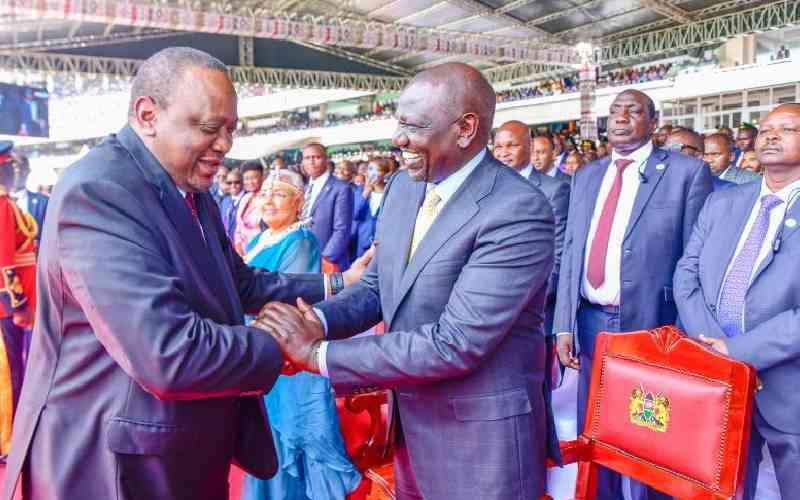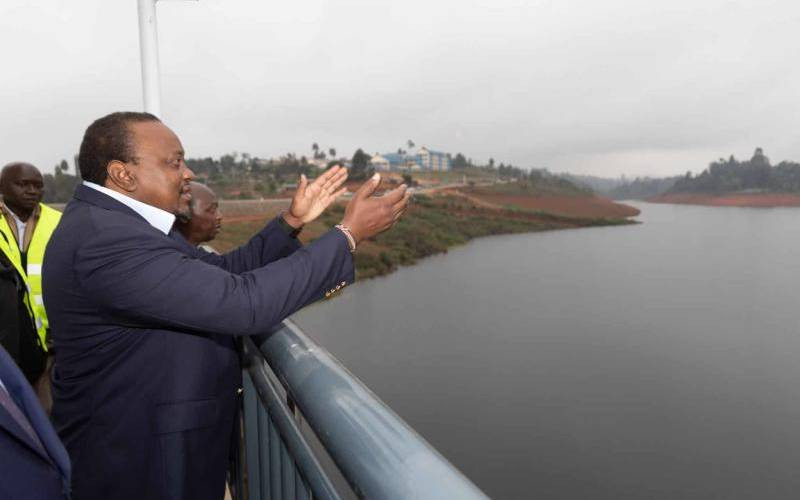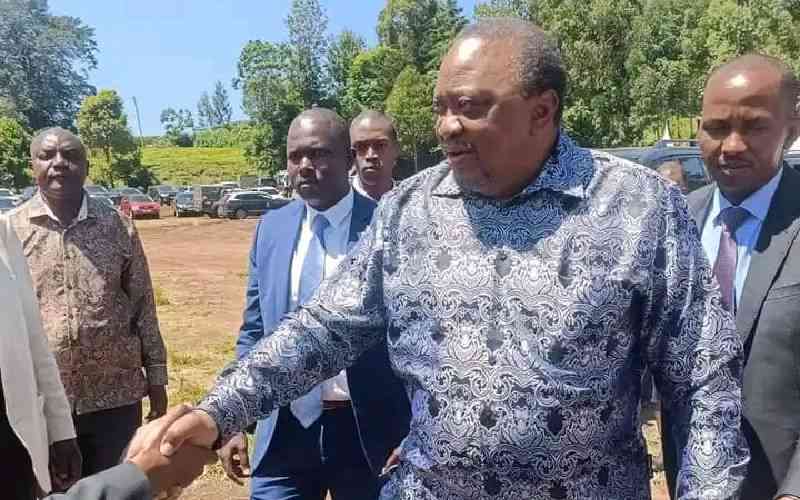NAIROBI, KENYA: President Uhuru Kenyatta Wednesday evening held talks with UN Secretary General Ban-Ki-moon that centred on Kenya’s role in fostering regional stability, underlining Nairobi’s standing on the global stage.
World Bank President Jim Yong Kim was part of the high-powered delegation at State House, Nairobi, and a development that signalled a vote of confidence in President Kenyatta’s administration on the back of frosty relations with Western powers over the International Criminal Court trials against the President and his deputy William Ruto.
Excitement about the high level entourage was discernible from a posting on social media by a State House official detailing the guests list prior to their arrival, with the rider the World Bank chief (the predecessor of the current president) last visited Kenya in 2003.
The opportunity to host the global chief is a diplomatic coup given earlier threats of isolation and denial of travel rights by the US and European states against the President over his trial in The Hague.
Kenya is preparing to challenge the handling of the case at the assembly of States signatory to the Rome Statute in December.
The President, UN boss and World Bank chief addressed a joint press conference at 9:30pm Wednesday. President Kenyatta acknowledged $8.3 billion aid from the international institutions to support peace and development programmes in the Horn of Africa.
“Kenya has been at the heart of regional peace initiatives. We will continue to provide our expertise and resources to support the region’s stability,” the President said.
Ban Ki-moon said he and Uhuru “had a good meeting” and he thanked Kenya for being “a great supporter of the UN”.
He said the discussions centred on stability of the Horn of Africa, terrorism and the ebola crisis.
“Kenya has shown resolve against terrorism. Regional partnerships are important to fight challenges including ebola which is a global problem,” said Ki-moon.
Kim said he was “delighted that President Kenyatta was leading efforts in regional peace and security”.
He said the Kenyan leader briefed him on the country’s progress including transformation through devolution.
“I pledge to provide World Bank resources and expertise to support the government,” he said.
Earlier, State House had indicated Ki-moon was to be accompanied by 24 officials including five heads of UN agencies and the World Bank chief had a delegation of 17, among them six senior managers.
Also in attendance were Islamic Development Bank President Ahmed Mohammed Ali and African Development Bank Special Advisor to the President Youssouf Ouedraogo.
Stay informed. Subscribe to our newsletter
The European Union was represented by European Commission Deputy Director for Development and Co-operation Marcus Cornaro.
Information released earlier indicated that the joint UN-World Bank tour of Africa, the third in the Horn of Africa in less than a year, is intended to discuss peace and development in the region.
On Monday in Addis Ababa, Ethiopia, the world leaders pledged political support and financial assistance for countries in the region including $8 billion (Sh712 billion) funding to boost economic growth and opportunity, reduce poverty and spur business activity in eight countries in the Horn of Africa.
Countries within the Horn of Africa are Djibouti, Eritrea, Ethiopia, Somalia, Sudan, Kenya, Uganda and South Sudan.
The World Bank pledged $1.8 billion (Sh160.2 billion).
“This new financing represents a major new opportunity for the people of the Horn of Africa to make sure they get access to clean water, nutritious food, healthcare, education, and jobs,” said World Bank Group President Dr Kim.
LONG-RUNNING CONFLICTS
The goal is to work with regional leaders through co-ordinated international action to tackle the root causes of long-running conflicts and under-development.
Ban Ki-moon had earlier said the countries in the Horn of Africa are making important yet unheralded progress in economic growth and political stability.
“Now is a crucial moment to support those efforts, end the cycles of conflict and poverty and move from fragility to sustainability,” he said.
It is understood that President Kenyatta and the World leaders discussed Kenya’s role in fostering regional security especially given the country has also borne the brunt of the conflict by hosting millions of refugees and its military involvement in Somalia to fight the Al-Shabaab terror cell.
An earlier communique from State House had indicated that the meeting would also discuss cross border issues such as trade, illicit financial flows, border control and movement of people and goods and jump-starting economic development in vulnerable areas through youth development and employment programmes.
State House hopes the region’s social, economic and political development can only be achieved through a climate of enhanced security and stability. The meeting also provided a rare opportunity for Kenya to showcase its role in the peace-making process and to create a better understanding in the international community of the burden and costs it bears as a host country including the increased exposure to terrorism, the communique partly read.
Emerging issues such as the maritime border dispute with Somalia or the labour dispute that is simmering with South Sudan has demonstrated the delicate line Kenya has to walk as a regional peace broker on one hand and as a sovereign nation that needs to protect its interests on the other.
“There is greater opportunity now for the Horn of Africa to break free from its cycles of drought, food insecurity, water insecurity and conflict by building up regional security, generating a peace dividend, especially among young women and men and spurring more cross border co-operation,” Kim said. The UN has joined other global and regional leaders to ensure a coherent and co-ordinated approach towards peace, security and development.
The EU also announced that it would support the region with $3.7 billion until 2020. About 10 per cent of this money will be for cross border activities.
The African Development Bank pledged $1.8 billion over the next three years, while the Islamic Development Bank committed to provide $1 billion in new financing in its four member countries in the Horn of Africa.
DISEASE SURVEILLANCE
The World Bank said its new $1.8 billion packaging, which is in addition to its existing development programmes for the eight countries, will create more economic opportunity for some of the most vulnerable people including refugees and internally displaced populations and their host communities.
World Bank will also help the region build up its communicable disease surveillance, diagnosis, and treatment capacity. Its pledge includes $600 million from the International Finance Corporation to support economic development.
– Additional reporting by Wilfred Ayaga.
 The Standard Group Plc is a
multi-media organization with investments in media platforms spanning newspaper
print operations, television, radio broadcasting, digital and online services. The
Standard Group is recognized as a leading multi-media house in Kenya with a key
influence in matters of national and international interest.
The Standard Group Plc is a
multi-media organization with investments in media platforms spanning newspaper
print operations, television, radio broadcasting, digital and online services. The
Standard Group is recognized as a leading multi-media house in Kenya with a key
influence in matters of national and international interest.
 The Standard Group Plc is a
multi-media organization with investments in media platforms spanning newspaper
print operations, television, radio broadcasting, digital and online services. The
Standard Group is recognized as a leading multi-media house in Kenya with a key
influence in matters of national and international interest.
The Standard Group Plc is a
multi-media organization with investments in media platforms spanning newspaper
print operations, television, radio broadcasting, digital and online services. The
Standard Group is recognized as a leading multi-media house in Kenya with a key
influence in matters of national and international interest.







